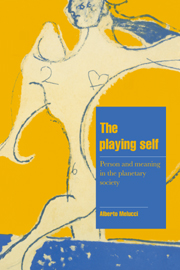Book contents
- Frontmatter
- Contents
- Introduction
- 1 The challenge of the everyday
- 2 Needs, identity, normality
- 3 Metamorphosis of the multiple self
- 4 The inner planet
- 5 Body as limit, body as message
- 6 On taking care
- 7 The abyss of difference
- 8 Amorous senses
- 9 Inhabiting the earth
- 10 A eulogy to wonder
- Epilogue
- Bibliographical note
- References
- Index
5 - Body as limit, body as message
Published online by Cambridge University Press: 04 October 2009
- Frontmatter
- Contents
- Introduction
- 1 The challenge of the everyday
- 2 Needs, identity, normality
- 3 Metamorphosis of the multiple self
- 4 The inner planet
- 5 Body as limit, body as message
- 6 On taking care
- 7 The abyss of difference
- 8 Amorous senses
- 9 Inhabiting the earth
- 10 A eulogy to wonder
- Epilogue
- Bibliographical note
- References
- Index
Summary
Body to body
The body invades our everyday experience. It has triumphed in the public and private arenas, as is evident in the profusion of images and objects that display it, and in the reception of the messages and appeals that make it their subject. Services providing care for the body proliferate, and experts are now to be found to cater to our every bodily need. Interest in physical health is in the increase, gymnastics has assumed expressive and hyper-technological forms, oriental disciplines and yoga enjoy unprecedented popularity. Although this search seems to concern single individuals only, it in fact expresses a transformation of needs which has led us to search, inspect, touch, name the body.
The body has acquired a new meaning first and foremost as a consequence of the way that we now define ourselves. We spring from a culture where the corporeal dimensions of human experience were either ignored or treated merely as instrumental to physical performance or work, always subordinate to mental and spiritual activities of a higher order. Today we have discovered our natural dimension; we have come to realize that we belong to nature, that we are but one species amongst the others. Under the influence of a divine principle of transcendence, the body was nothing but an index of the fallen, degraded nature which hampered the free rein of the spirit.
- Type
- Chapter
- Information
- The Playing SelfPerson and Meaning in the Planetary Society, pp. 71 - 82Publisher: Cambridge University PressPrint publication year: 1996



